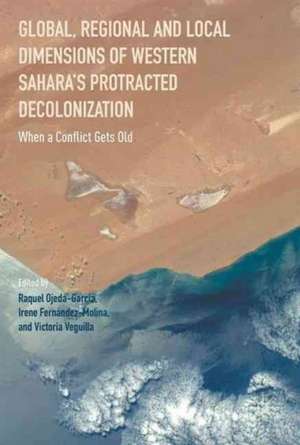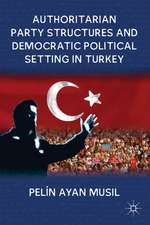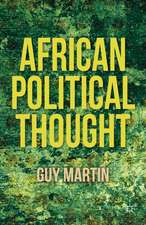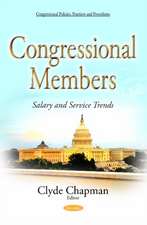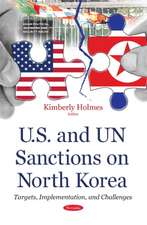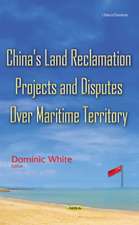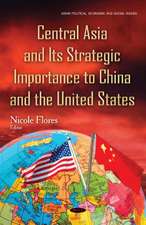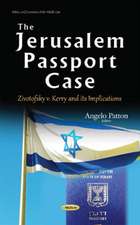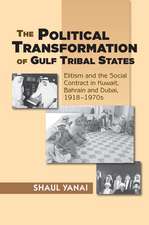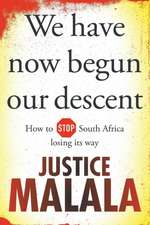Global, Regional and Local Dimensions of Western Sahara’s Protracted Decolonization: When a Conflict Gets Old
Editat de Raquel Ojeda-Garcia, Irene Fernández-Molina, Victoria Veguillaen Limba Engleză Hardback – dec 2016
This book explores the traces of the passage of time on the protracted and intractable conflict of Western Sahara. The authors offer a multilevel analysis of recent developments from the global to the local scenes, including the collapse of the architecture of the UN-led conflict resolution process, the advent of the War on Terror to the the Sahara-Sahel area and the impact of the ‘Arab Spring’ and growing regional security instability. Special attention is devoted to changes in the Western Sahara territory annexed by Morocco and the Sahrawi refugee camps in Algeria. Morocco has adapted its governance and public policies to profound socio-demographic transformations in the territory under its control and has attempted to obtain international recognition for this annexation by proposing an Autonomy Plan. The Polisario Front and Sahrawi nationalists have shifted their strategy and pushed the centre of gravity of the conflict back inwards by focusing on pro-independence activism inside the disputed territory.
| Toate formatele și edițiile | Preț | Express |
|---|---|---|
| Paperback (1) | 697.97 lei 6-8 săpt. | |
| Palgrave Macmillan US – 29 iun 2018 | 697.97 lei 6-8 săpt. | |
| Hardback (1) | 951.29 lei 6-8 săpt. | |
| Palgrave Macmillan US – dec 2016 | 951.29 lei 6-8 săpt. |
Preț: 951.29 lei
Preț vechi: 1160.10 lei
-18% Nou
Puncte Express: 1427
Preț estimativ în valută:
182.02€ • 190.56$ • 150.62£
182.02€ • 190.56$ • 150.62£
Carte tipărită la comandă
Livrare economică 05-19 aprilie
Preluare comenzi: 021 569.72.76
Specificații
ISBN-13: 9781349950348
ISBN-10: 1349950343
Pagini: 368
Ilustrații: XVII, 355 p. 1 illus.
Dimensiuni: 148 x 210 x 27 mm
Greutate: 0.61 kg
Ediția:1st ed. 2017
Editura: Palgrave Macmillan US
Colecția Palgrave Macmillan
Locul publicării:New York, United States
ISBN-10: 1349950343
Pagini: 368
Ilustrații: XVII, 355 p. 1 illus.
Dimensiuni: 148 x 210 x 27 mm
Greutate: 0.61 kg
Ediția:1st ed. 2017
Editura: Palgrave Macmillan US
Colecția Palgrave Macmillan
Locul publicării:New York, United States
Cuprins
1. Introduction: Towards a Multilevel Analysis of the Western Sahara Conflict and the Effects of its Protractedness .- 2. The United Nations’ Change in Approach to Resolving the Western Sahara Conflict since the Turn of the 21st Century .- 3. The Geopolitical Functions of the Western Sahara Conflict: US Hegemony, Moroccan Stability and Sahrawi Strategies of Resistance .- 4. The EU’s Reluctant Engagement with the Western Sahara Conflict: Between Humanitarian Aid and Parliamentary Involvement .- 5. Western Sahara and the Arab Spring .- 6. Algerian Foreign Policy towards Western Sahara .- 7. Beyond Western Sahara, the Sahel-Maghreb Axis Looms Large .- 8. The Role of Sahrawis and the Polisario Front in Maghreb-Sahel Regional Security .- 9. Western Sahara in the Framework of the New Moroccan Advanced Regionalization Reform .- 10. The Western Saharan Members of the Moroccan Parliament: Diplomacy and Perceptions of Identity .- 11. Changes in Moroccan Public Policies in Western Sahara and International Law: Adjustments to a New Social Context in Dakhla .- 12. Memory and Resistance: A Historical Account of the First “Intifadas” and Civil Organizations in the Territory of Western Sahara .- 13. Western Saharan and Southern Moroccan Sahrawis: National Identity and Mobilization .- 14. The View from Tindouf: Western Saharan Women and the Calculation of Autochthony .- 15. “For us, Parliament is a Tool for Liberation”: Elections as an Opportunity for a Transterritorial Sahrawi Population .- 16. Conclusion.
Recenzii
“[This] volume … adeptly illustrates how the conflict’s oft-noted intractability entails not only continuity over time, but also the emergence of new dynamics. … Leaving aside causal arguments at a time when conflict resolution appears as distant as ever allows the volume’s contributors to consider emergent developments in the Western Sahara from a wide range of perspectives. This is nowhere more evident than in the series of studies and contributions that engage with identity, subjectivity and lived experience. … This study reflects—or perhaps, even, is a step ahead of—developments in the field by showcasing the burgeoning literature on Western Sahara that engages with lived experience. … This volume represents a major contribution in bringing together contributors from Spain, the UK, France, Mexico and the United States, to break language-based silos that too often inhibit crossfertilization … .” (Mark Drury, The Journal of North African Studies, September 16, 2017)
Notă biografică
Raquel Ojeda-García is Senior Lecturer in Political and Administrative Science at the University of Granada, Spain.
Irene Fernández-Molina is Lecturer in the Politics Department at the University of Exeter, UK.
Victoria Veguilla is Lecturer in Political and Administrative Science at the Pablo de Olavide University, Spain.
Textul de pe ultima copertă
This book explores the traces of the passage of time on the protracted and intractable conflict of Western Sahara. The authors offer a multilevel analysis of recent developments from the global to the local scenes, including the collapse of the architecture of the UN-led conflict resolution process, the advent of the War on Terror to the the Sahara-Sahel area and the impact of the ‘Arab Spring’ and growing regional security instability. Special attention is devoted to changes in the Western Sahara territory annexed by Morocco and the Sahrawi refugee camps in Algeria. Morocco has adapted its governance and public policies to profound socio-demographic transformations in the territory under its control and has attempted to obtain international recognition for this annexation by proposing an Autonomy Plan. The Polisario Front and Sahrawi nationalists have shifted their strategy and pushed the centre of gravity of the conflict back inwards by focusing on pro-independence activism inside the disputed territory.
Caracteristici
Provides a multilevel analysis of the Western Sahara conflict on local, regional and international levels Presents the realities of Moroccan governance in Western Sahara, including electoral and housing policies Examines the effect of the Western Sahara conflict on regional security, migration and cultural identity Explores the role and changing attitude of the international community to the Western Sahara conflict, with a focus on the UN, EU, France and Spain
